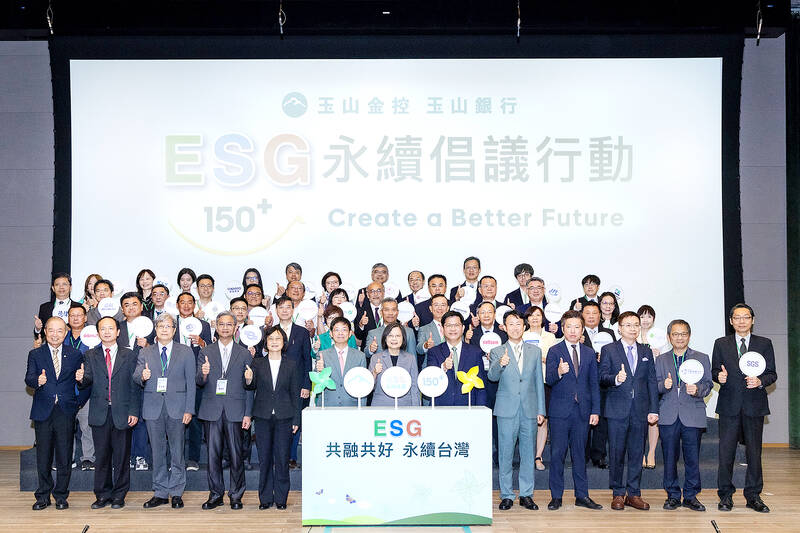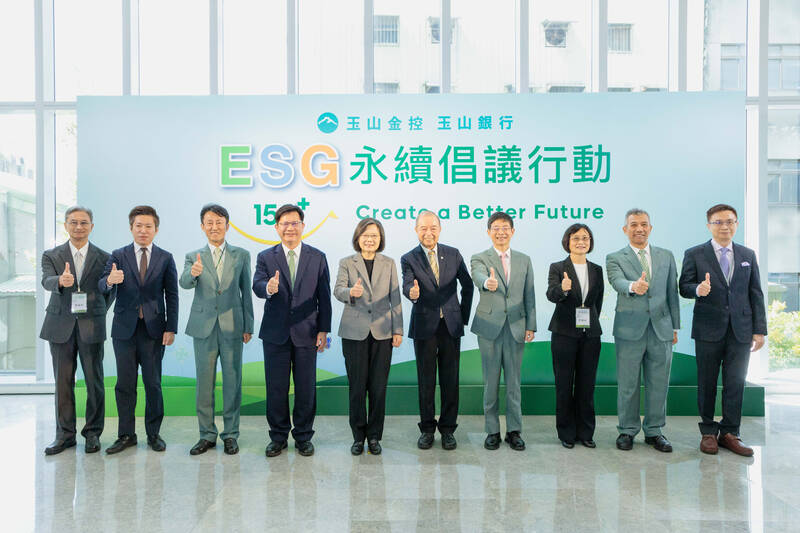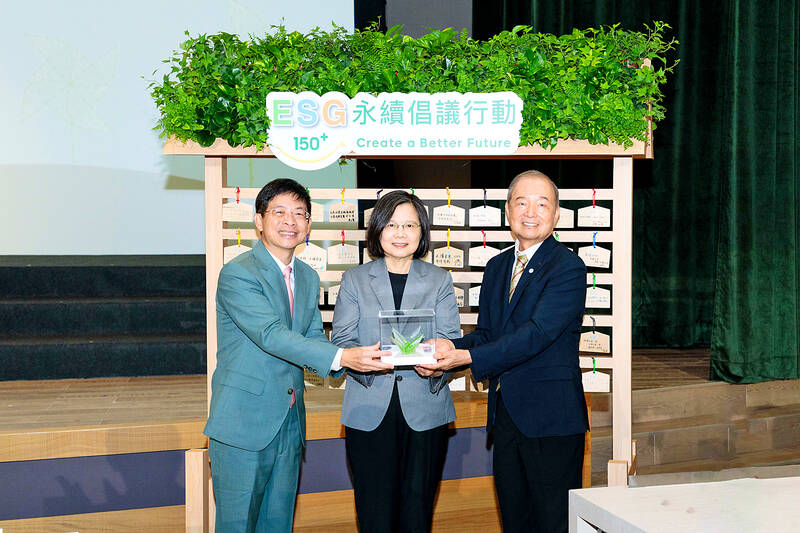E.SUN Bank’s “E.SUN ESG Initiative Event” was convened for the third consecutive year in Taipei, Taiwan. President Tsai Ing-wen, Secretary-General Lin Chia-lung, Deputy Minister Yeh Chun-hung of the Ministry of the Environment, and Vice Chairman Chiu Shu-chen of the Financial Supervisory Commission (FSC) attended to support. More than one hundred excellent companies enrolled the initiative to advocate for the implementation of net-zero target.
The “E.SUN Sustainability Initiative Event” was launched in 2021 with 32 participating corporates, in 2022, the initiative garnered significant response, with a total of 101 influential companies accounted for an impressive NT$5.08 trillion in total revenue, they represented over 23% of Taiwan’s GDP in 2021. This year, the number of participating companies has increased to 157, including top performers in global market share, key component suppliers, and Taiwanese enterprises running in the USA, Australia, and ASEAN countries. Experienced consulting firms specializing in sustainability and net-zero also joined the initiative. They are committed to reducing greenhouse gas emissions through concrete energy-saving and carbon reduction actions to mitigate environmental impact.
President Tsai Ing-wen wrote down her blessing message “A better Taiwan to the World”, demonstrating her determination to accelerate the transition to net-zero. She appreciated that more companies are joining the ESG advocacy, and she expresses strong confidence in Taiwan’s bright future. President Tsai noted that the more companies start taking actions, the closer we can reach the target. President Tsai expects more companies to take action and to engage stakeholders in zero-carbon transformation, turning challenges into new opportunities, enabling Taiwan’s industries with strong competitiveness to face the global trend of sustainable development and the requirements of green supply chains.

Photo: E.SUN Bank
E.SUN specially invited Helen Clarkson, CEO of The Climate Group, and Sam Kimmins, Chairman of RE100, to share their expectations and encouragement for Taiwan’s sustainable development through video. Additionally, the event featured expert discussions focusing key issues from various angles, including international trends, government policy, corporate practices, and talent development, to help address the challenges of net-zero sustainability and implement sustainability transformation effectively.
Chairman of E.SUN Joseph Huang emphasized that sustainability and climate action have become a new global language. Through the collective strength of the financial sector, E.SUN aims to amplify its positive influence and expand global perspective alongside its advocacy partners, and strengthening Taiwan’s sustainable competitiveness!

Photo: E.SUN Bank

Photo: E.SUN Bank

Taiwan Semiconductor Manufacturing Co (TSMC, 台積電) would not produce its most advanced technologies in the US next year, Minister of Economic Affairs J.W. Kuo (郭智輝) said yesterday. Kuo made the comment during an appearance at the legislature, hours after the chipmaker announced that it would invest an additional US$100 billion to expand its manufacturing operations in the US. Asked by Taiwan People’s Party Legislator-at-large Chang Chi-kai (張啟楷) if TSMC would allow its most advanced technologies, the yet-to-be-released 2-nanometer and 1.6-nanometer processes, to go to the US in the near term, Kuo denied it. TSMC recently opened its first US factory, which produces 4-nanometer

GREAT SUCCESS: Republican Senator Todd Young expressed surprise at Trump’s comments and said he expects the administration to keep the program running US lawmakers who helped secure billions of dollars in subsidies for domestic semiconductor manufacturing rejected US President Donald Trump’s call to revoke the 2022 CHIPS and Science Act, signaling that any repeal effort in the US Congress would fall short. US Senate Minority Leader Chuck Schumer, who negotiated the law, on Wednesday said that Trump’s demand would fail, while a top Republican proponent, US Senator Todd Young, expressed surprise at the president’s comments and said he expects the administration to keep the program running. The CHIPS Act is “essential for America leading the world in tech, leading the world in AI [artificial

REACTIONS: While most analysts were positive about TSMC’s investment, one said the US expansion could disrupt the company’s supply-demand balance Taiwan Semiconductor Manufacturing Co’s (TSMC, 台積電) new US$100 billion investment in the US would exert a positive effect on the chipmaker’s revenue in the medium term on the back of booming artificial intelligence (AI) chip demand from US chip designers, an International Data Corp (IDC) analyst said yesterday. “This is good for TSMC in terms of business expansion, as its major clients for advanced chips are US chip designers,” IDC senior semiconductor research manager Galen Zeng (曾冠瑋) said by telephone yesterday. “Besides, those US companies all consider supply chain resilience a business imperative,” Zeng said. That meant local supply would

BIG INVESTMENT: Hon Hai is building the world’s largest assembly plant for servers based on Nvidia Corp’s state-of-the-art AI chips, Jalisco Governor Pablo Lemus said The construction of Hon Hai Precision Industry Co’s (鴻海精密) massive artificial intelligence (AI) server plant near Guadalajara, Mexico, would be completed in a year despite the threat of new tariffs from US President Donald Trump, Jalisco Governor Pablo Lemus said. Hon Hai, also known as Foxconn Technology Group (富士康科技集團), is investing about US$900 million in what would become the world’s largest assembly plant for servers based on Nvidia Corp’s state-of-the-art GB200 AI chips, Lemus said. The project consists of two phases: the expansion of an existing Hon Hai facility in the municipality of El Salto, and the construction of a